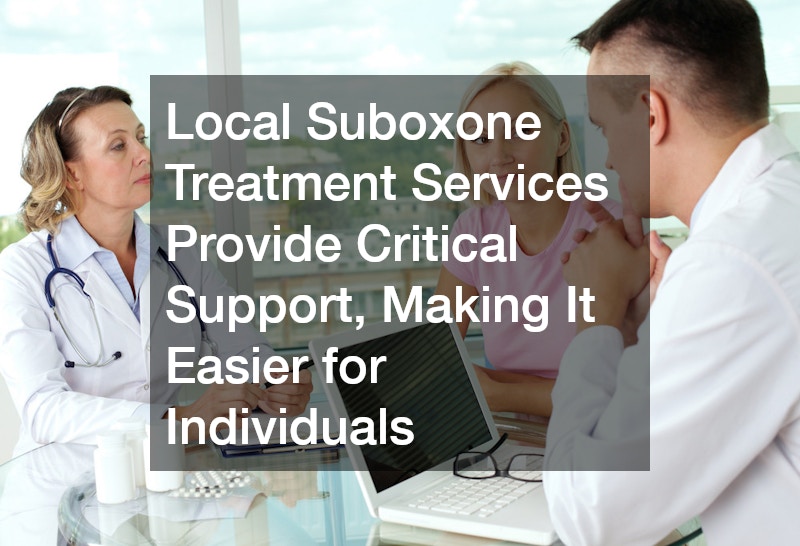In recent years, the opioid crisis has become an urgent and pervasive challenge facing many communities across the country. Addiction to opioids, including prescription pain relievers, heroin, and synthetic drugs such as fentanyl, has led to a surge in overdose deaths and a heightened need for effective treatment solutions. One of the proven methods for managing opioid dependence is through Suboxone treatment. By providing reliable Local Suboxone Treatment services, communities can offer compassionate support essential for the road to recovery. Local treatment centers are essential in making Suboxone therapy accessible and effective for those who need it most.
Suboxone, a combination of buprenorphine and naloxone, is used in medication-assisted treatment (MAT) programs to help reduce cravings and withdrawal symptoms. This treatment is not only clinically effective but also breaks down barriers for individuals seeking help. By integrating Suboxone into their recovery plan, patients can experience greater stability and the possibility of a life without the overwhelming grip of addiction. However, the success of these treatments often hinges on the availability and accessibility of Local Suboxone Treatment services.
Access to localized treatment improves patient outcomes, offering both convenience and personalized care that can make a significant difference in recovery success. Local Suboxone Treatment services provide critical support, making it easier for individuals to stick with their recovery plan. With community-focused resources, patients have a constant source of motivation and accountability, helping to avoid relapses and ensuring continued progress. We must focus on strengthening these local infrastructures to combat the opioid crisis effectively.
Benefits of Suboxone Treatment
Suboxone treatment offers several benefits for individuals battling opioid addiction, primarily by reducing withdrawal symptoms and cravings. This allows patients to focus on their recovery journey without the disruptive cycles of frequent relapses. Scientific studies have shown that patients on Suboxone are less likely to drop out of treatment compared to those who attempt abstinence-based recovery. This increase in patient retention is crucial, as sustained engagement in treatment is a strong predictor of long-term recovery success.
Suboxone treatment is associated with a lower risk of overdose compared to methadone, another common medication used in opioid addiction treatment. The presence of naloxone in Suboxone helps deter misuse and enhances the safety profile of the medication. For many patients, the fear of overdose is a significant barrier to seeking help, and Local Suboxone Treatment services can help alleviate these concerns. When properly administered under the supervision of medical professionals, Suboxone can provide a stable path towards recovery.
Local Suboxone Treatment centers also often offer comprehensive care plans that include counseling and support groups, addressing both the physical and psychological aspects of addiction. This holistic approach is essential, as addiction is a multifaceted issue that requires a nuanced response. By delivering services that encompass therapy and community support, these centers can significantly improve the prospects of recovery. Such integrated care models promote healing and empower patients to reclaim their lives from the debilitating impacts of addiction.
The Role of Local Treatment Centers
Local treatment centers are pivotal in providing accessible Suboxone treatment options, ensuring that help is within reach for those who need it. These centers are often the first point of contact for individuals seeking help, making their presence and accessibility vital. Community-based centers can quickly assess and enroll patients in treatment programs, reducing the wait times that often deter individuals from pursuing help. The local approach means treatments can be tailored to fit the specific needs and dynamics of the community they serve.
Local Suboxone Treatment centers are critical in reducing the stigma associated with addiction treatment. By normalizing access to and discussions around recovery, these facilities help cultivate an environment where seeking help is seen as a courageous and normal step towards health, rather than one stigmatized or hidden away. The visibility of these services within the community can be empowering for current and potential patients, affirming that recovery is possible and supported by those around them. Community awareness initiatives led by these centers play a significant role in expanding understanding and empathy regarding addiction and recovery.
These centers also provide a supportive network that can help foster a community of individuals in recovery. This can include peer support programs, where individuals can share their experiences and strategies for overcoming challenges, significantly bolstering their resolve. By building a sense of camaraderie and mutual support, patients often experience less isolation and more motivation to pursue a substance-free life. Such environments are crucial for maintaining sobriety and long-term recovery success.
The opioid crisis remains a grave public health challenge, but Local Suboxone Treatment services offer a beacon of hope for individuals battling addiction. By providing effective Suboxone treatment, coupled with supportive community resources, local centers play a pivotal role in facilitating recovery and reducing the stigma of seeking help. Together, these elements create a more robust support system that is crucial for long-term recovery success.
Continuing to invest in and promote Local Suboxone Treatment services means more individuals can have access to the resources they need within their community. By removing barriers to treatment, these services make it feasible for people to reclaim their lives from addiction. The path to recovery is often fraught with challenges, but with local support, patients have a greater chance of overcoming their dependencies and achieving lasting sobriety.
It is vital that communities continue to support and develop local infrastructure that provides comprehensive Suboxone treatment. The benefits of ensuring ready access to these services are significant, helping to improve public health outcomes and restore hope to individuals and communities affected by the opioid epidemic. Local Suboxone Treatment centers are a powerful force for change, driving progress toward a future where recovery is attainable for everyone who seeks it.


